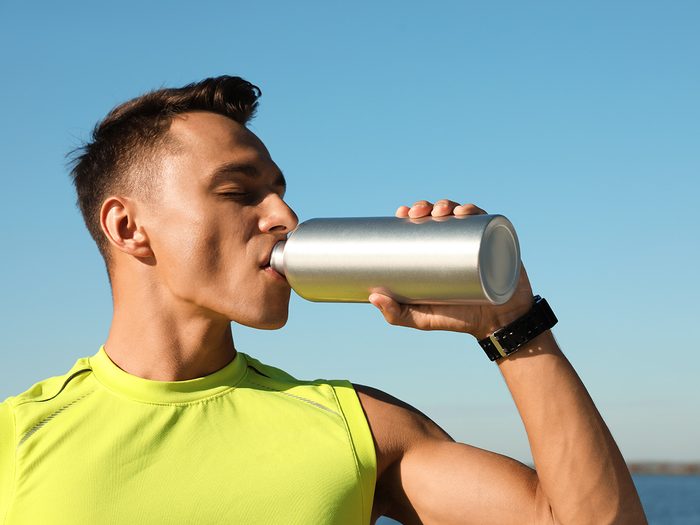
Why Hydrating Drinks Are Important
Water keeps our most basic functions running—from blood circulation to temperature regulation through sweating to digestion and more.
Our bodies are about 60 percent water and if we don’t get enough to drink, dehydration—defined as a body-water loss of at least one to two percent of your weight—can cause dizziness, fatigue and headaches. Both our body-water content and our thirst perception diminish as we age, putting seniors at greater risk of dehydration.
An easy way to gauge your hydration levels is by the colour of your urine and how often you pee (ideally more than four times per day). “It doesn’t need to be clear all the time, but it should be light like lemonade, not dark like apple juice,” says Isabel Maples, a registered dietitian based in Washington, D.C., and a spokesperson for the Academy of Nutrition and Dietetics. “Keep in mind that some medications and supplements can also affect urine colour.”
So how much water do we need to drink? You may have heard of the decades-old eight-glasses-a-day guideline, but experts say that’s not supported by current research. “In reality, fluid needs vary from day to day and from person to person,” says Maples.
The average adult male requires about three litres of fluids a day, while the average female should consume just over two litres. Other factors, such as temperature, altitude, intense exercise and certain medications, can increase those needs.
Of course, water isn’t the only hydrating drink out there. An estimated 20 percent of our fluid intake comes from foods, and the rest can be a combination of water and other hydrating drinks. Here are several you can choose from.

Coffee
Go ahead and order a large coffee. Caffeinated drinks do have mild diuretic properties, but there’s no evidence that they lead to dehydration. “Coffee and tea may increase urination in the short term, but the fluid intake offsets that loss,” says Toronto-based registered dietitian Drew Hemler.
A 2014 U.K. study published in the journal PLOS One measured the body water of subjects in two groups: one that drank 800 millilitres of coffee a day and the other an equal amount of water. After controlling for food intake and exercise, researchers found no significant difference in hydration levels.
“There is no reason why caffeinated beverages can’t count toward your daily fluid totals, as long as you’re used to the caffeine,” says Maples. Five or more 250-millilitre cups of coffee a day. is excessive, she says, but three to four cups is within healthy limits.
Learn more about how your daily dose of caffeine is affecting your body.

Tea
Both black and green tea have about the same hydration benefits as coffee, with the added boost of heart-protecting antioxidants. Soothing brews like chamomile or mint are caffeine-and calorie-free, and their taste may encourage you to drink more. “Hibiscus tea, in particular, is packed with antioxidants and flavonoids,” says Hemler, due to the anti-inflammatory pigment molecules that give hibiscus its bright red colour.
If you aren’t drinking green tea every day, this might convince you to start.
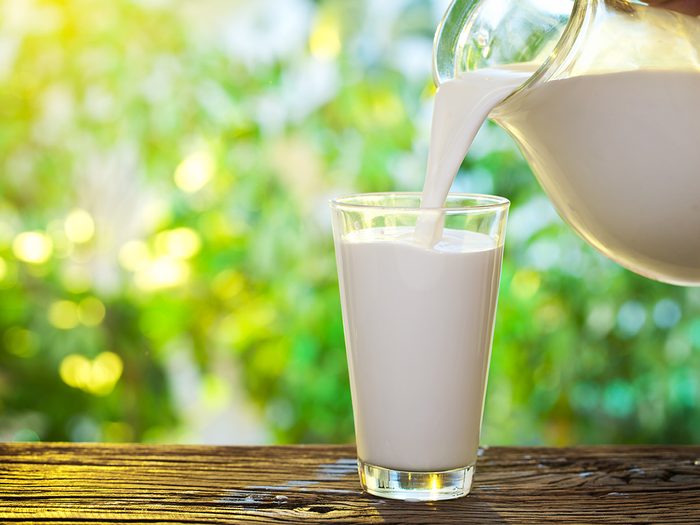
Milk
In a 2015 study published in the American Journal of Clinical Nutrition, British researchers found that cow’s milk, both full-fat and skim, is a more hydrating drink than plain water. That’s because it takes longer to digest than water, allowing the body to absorb more fluids. In the study, subjects who drank milk produced less urine over four hours than those who drank an equal amount of other fluids, and showed higher hydration levels in their blood. Milk also supplies three nutrients that most of us need more of: potassium, vitamin D and calcium.
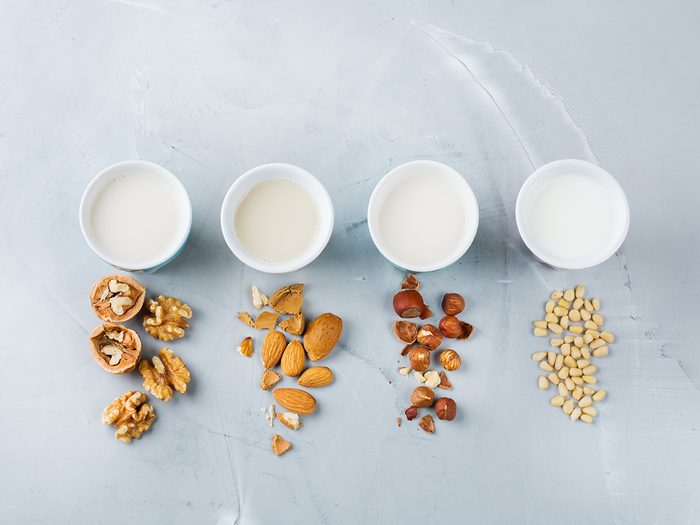
Plant milks
The nutritional profiles of non-dairy milk options (soy, almond, oat and coconut are top sellers) vary. But most are low-calorie, low-cholesterol and more environmentally sustainable alternatives to dairy. “Some plant milks are fortified with calcium and vitamins A, D and B12, as well as other nutrients commonly added to cow’s milk,” says Hemler. “However, they fall short on protein.” Only soy milk comes close, at six grams per cup, compared to eight grams for cow’s milk.
Plant milks are higher in water compared with dairy—almond milk is 97 percent water, and cow’s milk is 87 to 90 percent—but because they lack dairy’s protein and carbohydrates, they pass through the digestive system faster, putting them roughly on par with water as hydrating drinks.
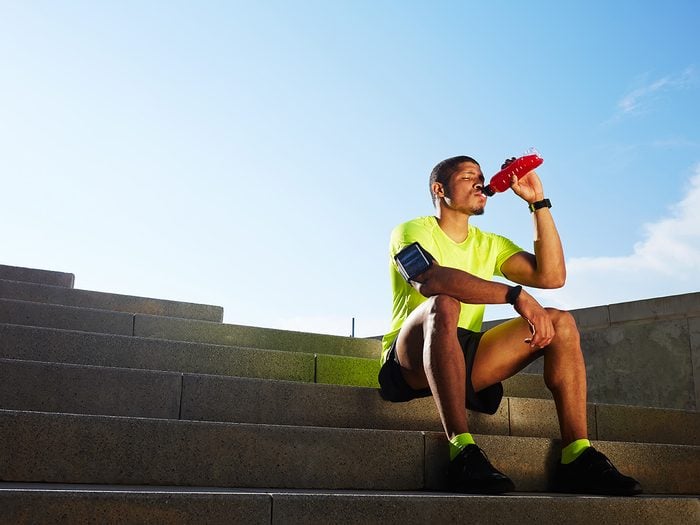
Sports drinks
Available in a range of colours and fruity flavours, sports beverages are advertised as being more hydrating drinks than water. But that’s only accurate because people tend to drink more of something that tastes good, says Hemler. “If you’re trying to lose weight, be aware that these drinks can also increase your total carbohydrates and calories,” he says.
A 600-millilitre bottle contains up to 35 grams, or eight teaspoons, of sugar, but there are low- or no-sugar options. (Find out how sugar is making you sick.)
Sports drinks do supply electrolytes—minerals that support hydration and muscle function—and can be helpful in recovery from intense exercise lasting more than an hour. An electrolyte-enriched drink can also help rehydrate you after an episode of severe diarrhea or vomiting.
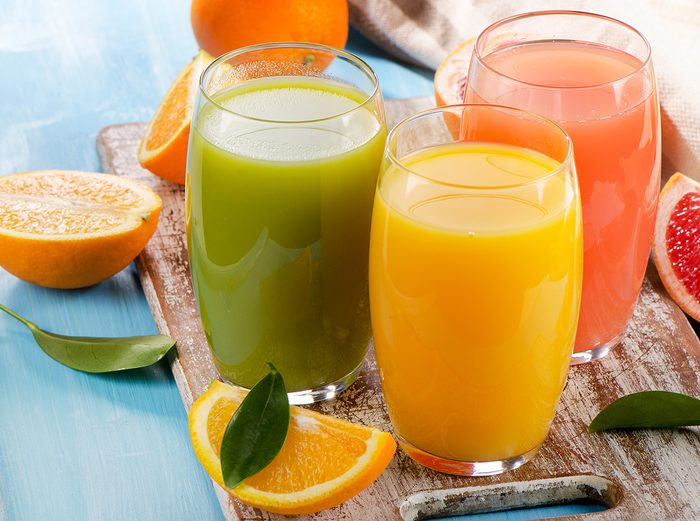
Juice
Fruit and vegetable juices with no added sugar are an excellent source of vitamins, minerals and antioxidants, which can reduce inflammation and help prevent age-related diseases. Natural sugars, like fructose and lactose, are digested more slowly than processed sugar, helping stabilize your metabolism. Orange juice has slightly better hydration than water, according to a 2015 British study that measured subjects’ urine output after consuming different drinks.
In addition to consuming these hydrating drinks, learn the essential vitamins your body needs to stay healthy.
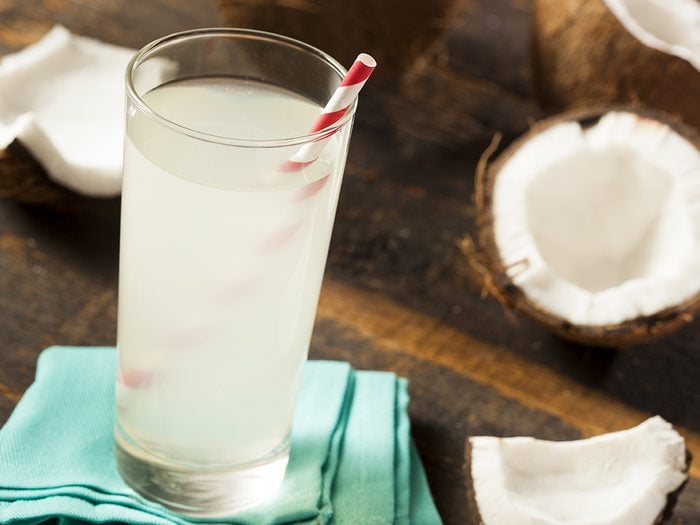
Coconut water
Technically a fruit juice, this clear, slightly sweet liquid contains hydration-aiding electrolytes, namely sodium, magnesium and potassium. In fact, 250 millilitres contains more potassium than a banana. It’s marketed as a natural exercise-recovery drink, but a 2012 study published in the Journal of the International Society of Sports Nutrition found no significant hydration difference between coconut water, sports drinks and water. If you like something sweeter than water but are watching your calories and carbs, coconut water is a healthier option than some sports drinks, at 45 to 60 calories and six grams of sugar per 250 millilitres.
Learn to spot the symptoms of iron deficiency.
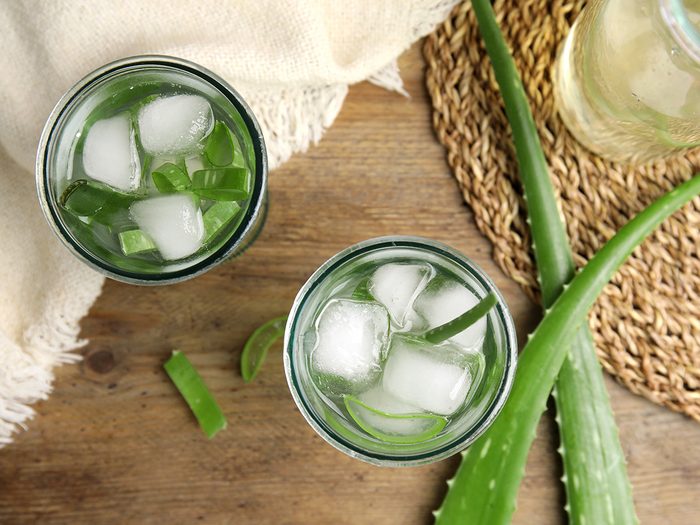
Aloe vera
The gel of the aloe plant is well known as a skin salve for its moisturizing and burn-soothing properties, but it can also be mixed with water to make a refreshing, hydrating drink. Aloe is rich in polyphenols, a type of antioxidant, and research from a 2016 study published in the journal Nutrients suggests it may even help control blood sugar. (Here are 10 home remedies that are backed by science.)
You could make your own, but it’s best to buy bottled aloe juice; the sticky latex inside the aloe leaf can cause stomach upset if not carefully removed.
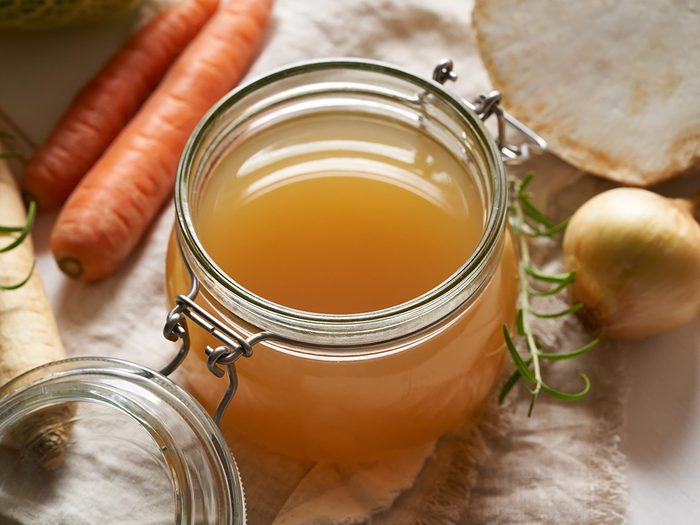
Bone broth
Made by simmering chicken or beef bones and cartilage with vegetables for a minimum of 12 hours, bone broth has become trendy as a comforting drink with anti-inflammatory properties, thanks to the amino acids derived from collagen.
With its added salt, it can also replenish electrolytes; sodium helps the body retain fluids. Too much sodium, however, can put extra pressure on your blood vessels, making your heart work harder.
“Your recommended limit for sodium intake is 2,300 milligrams a day, and 500 millilitres of bone broth can contain a quarter of that,” says Hemler. If you buy bone broth, low-sodium versions are best, or you can make your own and reduce or skip the salt.
Now that you know which hydrating drinks will quench your thirst, find out what booze really does to your body.